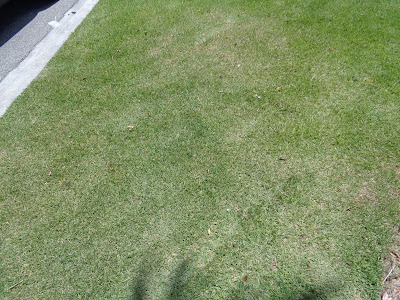Two universal truths about lawns – there is no perfect
grass, they all have their advantages and disadvantages, and lawns go from
order to disorder over a period of time unless you step in and make corrections
while they are small. St. Augustine grass and Bahia grass are popular lawn
subjects, but many people are looking at Zoysia grass. This relatively
new grass to the neighborhood offers a different texture and improved overall performance compared to past Zoysia
cultivars thanks to breeding efforts. Is Zoysia grass for you?
Let’s look at the advantages and disadvantages of using
Zoysia as turf grass. Zoysia can be maintained on less nitrogen than St.
Augustine grass, has a very dense growth habit, and can be mowed fairly low –
two to two and one-half inches in the case of ‘Empire’ Zoysia, a common
cultivar. On the flip side, it takes as much water as St. Augustine (and will go dormant and turn brown without water), is susceptible to hunting billbug (an insect
pest) and can develop a fungal disease called large patch. Nematodes also
apparently love to damage Zoysia grass. For
the most part, these
disadvantages can be managed. Zoysia is established with either vegetative plugs or sod. There is no
need to apply fertilizer until thirty to sixty days after establishment.
Then, the use of a turf fertilizer such as a 15-0-15, 14-0-26 or its
equivalent, with a fifty-percent slow release nitrogen formulation, can be applied. Apply this at a rate of up
to one pound of actual nitrogen per thousand square feet per application
totaling three to four pounds nitrogen per one-thousand square feet per
year. Don’t forget to review our Charlotte County Fertilizer Ordinance -
please see here - http://charlotte.ifas.ufl.edu/horticulture/hort-fertilizer1.htm
. Mow when the grass blades are three to four inches high so that
you remove about one-third of the grass blade. Water so that you apply
one-half to three-quarter of an inch of irrigation per event. This amount
of water will reach eight inches down right where most of the roots are
located.
As mentioned above, hunting billbugs, a tiny weevil, are
perhaps the most common Zoysia grass insect pest. Most of the damage
occurs from fall to spring with symptoms including damaged stems and rhizomes
causing patches of turf to die in an irregular pattern. Large patch is a
fungal disease that is also most common during the cooler part of the
year. Large patch causes yellow patches to
develop which turn brown and can expand to several feet in
diameter. While there are fungicides to control this disease, cultural
practices such as not using excessive nitrogen during seasons most conducive to
this disease, and limiting irrigation to early morning so that the grass can
dry out. Mow diseased areas last and wash grass clippings off before
mowing disease-free areas.
‘Empire’ Zoysia is the most popular Zoysia in our area and
the cultivar most likely to be found at garden centers and sod farms.
Good color and successful performance on sandy soils and competitive growth
make ‘Empire’ an appropriate choice.
Keep in mind that ‘Empire’ is not very shade-tolerant,
so check your site for light conditions. Zoysia offers a different
texture that our other common warm-season grasses do not provide. That
other turfgrass, Zoysia is becoming more popular all the time! For more
information on all types of turf questions, please call our Master Gardener
volunteers on the Plant Lifeline on Mondays, Wednesdays and Fridays from 1 to 4
pm at 764-4340 for gardening help and insight into their role as an Extension
volunteer. Don't forget to visit our other County Plant Clinics in the
area. Please check this link for a complete list of site locations, dates
and times - http://charlotte.ifas.ufl.edu/horticulture/Plant%20Clinics%20Schedule.pdf.
Resources:
Unruh, J. B., Trenholm, L. E. & Cisar, J. L. (2013)
Zoysiagrass for Florida Lawns. The University of Florida Extension
Service, IFAS,
Elliott, M. L. & Harmon, P. F. (2014) Large Patch the
University of Florida Extension Service, IFAS,

Awesome post. My husband and I want to plant some grass in our currently dirt yard, and your article had great tips to help us choose the best grass for our needs. I liked how you said to consider Zoysia, as it has average shade tolerance and is high quality while still being low maintenance. Thanks; we’ll keep this in mind when choosing grass for our yard.
ReplyDeleteGood post and informative. Thank you very much for sharing this good article, it was so good to read and useful to improve my knowledge as updated, keep blogging. Thank you for your post. This is excellent information. It is amazing and wonderful to visit your site. bermuda grass sydney
ReplyDeleteVery informative post! I appreciate how clearly you explained the features and benefits of each grass type. This really helps in making a proper choice for park environments.
ReplyDeleteTims Total Turf Care Reliable Sir Walter Buffalo in Adelaide Installation Services. Tims Total Turfcare takes pride in offering a wide range of instant turf to residential and commercial spaces in Adelaide, including Sir Walter Buffalo.